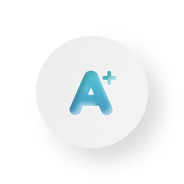© Copyright 2022 Cakap | PT Cerdas Digital Nusantara
Korean for Kids
Course Overview
This level designed to for children ages 5 to lower grade primary school children and is aimed at enabling children to be able read Korean vowels and consonants and help them to understand basic Korean sentence structures.
Levels
Level Starter 1
Equivalent to TOPIK I Level 1Learning Goals
Can recognize Hangeul letters and arrange syllable formations. Can write and read the vocabulary obtained from examples of letters correctly. Can recognize Hangeul letters and arrange syllable formations. Can write and read the vocabulary obtained from examples of letters correctly. Can also introduce themselves and others as well as ask and answer questions about personal details such as where they live, people they know and things they own.
Lesson Materials
Total of 12 materials
Simple Vowels (기본 모음)
Students can recognize, memorize and write basic Korean vowels as well as find examples of vocabulary for each letter.
Simple Consonants (기본 자음)
Students can recognize, memorize and write basic Korean consonants as well as find examples of vocabulary for each letter.
Syllable Formation (음절 만들기)
Students can write and arrange syllables from Korean letters as well as find examples of vocabulary for each syllable.
Compound Vowels 1 (복합 모음 1)
Students can recognize, memorize and write compound vowels as well as find examples of vocabulary for each letter.
Level Starter 2
Equivalent to TOPIK 1 Level 1Learning Goals
Can understand and use familiar everyday expressions and very basic phrases. Can ask where things are and interact in a simple way as long as the other person speaks slowly and clearly and is ready to help. Can introduce their residence in a simple way. Can ask where they are going. Also can ask and answer questions about personal details like where they live, people they know, what they do and things they have. Can ask and answer questions about what they like. Can ask and answer questions about who and when they did something.
Lesson Materials
Total of 12 materials
Yes, They Are Grapes (네, 포도예요)
Students can use the (-예요) particle and understand the vocabulary of fruits, animals and objects in Korean.
Where Is This Place? (여기가 어디예요)
Students can use (-어디예요) to ask and answer questions about places and know the vocabulary of place names in Korean.
There Is A Cat In The Room (방에 고양이가 있어요)
Students can use the (-있어요) particle and practice additional vocabulary in Korean.
Where Is It? (어디에 있어요?)
Students can ask and answer questions with (-있어요) expression and practice additional vocabulary in Korean.
Level Primary 1A
Equivalent to TOPIK I Level 1Learning Goals
Can ask and answer questions with a variety of expressions. Can ask and answer possessive expressions and verbs about doing something. Can learn various nouns and verbs in Korean. Can recognize, memorize and write types of Korean numbers. Can ask and answer with expressions of affection and gratitude and practice additional vocabulary in Korean. Can use various particles in expressions and phrases. Can understand and practice various vocabulary in Korean.
Lesson Materials
Total of 12 materials
Do You Have A Toy Train? (장난감 기차가 있어요?)
Students can ask and answer questions with the phrase ‘Do you have’ (있어요) and learn Korean noun vocabulary.
It Is My Book (제 책이에요)
Students can ask and answer possessive expressions (-이에요) and learn Korean noun vocabulary.
This Is Not A Skirt (치마가 아니에요)
Students can ask questions and answer with ‘no’ (-이에요) and learn Korean noun vocabulary.
I Ride On A Swing In The Playground (놀이터에서 그네를 타요)
Students can ask and answer questions about verbs about doing something and know other vocabulary of verbs in Korean.
Level Primary 1B
Equivalent to TOPIK I Level 1Learning Goals
Can ask and answer questions with phrases about hobbies and daily activities. Can know and understand various vocabulary about hobbies and activities in Korean. Can ask and answer questions with phrases about hobbies, positions, and shopping locations. Can know and understand various vocabulary about hobbies, positions, and shopping locations in Korean. Can ask and answer questions with phrases about holidays and school activities. Can know and understand various vocabulary about holidays and school activities in Korean.
Lesson Materials
Total of 12 materials
My Hobby Is Playing Baseball (내 취미는 야구하기예요)
Students can ask and answer questions with expressions about hobbies and practice vocabulary in Korean.
I Play Soccer With My Father (아빠하고 축구를 해요 )
Students will be able to use the particle (-하고 -를 ) and understand vocabulary about activity schedules in Korean.
I Also Like Baseball (나는 야구도 좋아해요)
Students can use the particle (도) and practice vocabulary about various hobbies in Korean.
I Go To A Library Often (도서관에 자주 가요)
Students can ask and answer questions with expressions about hobbies and know vocabulary about hobbies in Korean.
Level Primary 2A
Equivalent to TOPIK I Level 1Learning Goals
Can ask and answer questions with expressions about the ideals of weekend activities and school schedules. Can practice the topics studied with a variety of games, listening, writing and reading exercises. Can know and understand various vocabulary about ideals, weekend activities and school schedules in Korean. Can ask and answer questions with phrases about festival games and events. Can practice the topics studied with a variety of games, listening, writing and reading exercises. Be able to know and understand various vocabulary about festival games and events in Korean. Can ask and answer questions with phrases about exhibitions, buying and selling, and concert events. Can practice the topics studied with a variety of games, listening, writing and reading exercises. Can know and understand various vocabulary about exhibitions, buying and selling, and concert culture in Korean. Can ask and answer questions with phrases about graduation ceremonies, types of date and day and weather in Korea. Can practice the topics studied with a variety of games, listening, writing and reading exercises. Can know and understand a variety of vocabulary about graduation ceremonies, other important cultural events and the weather in Korea.
Lesson Materials
Total of 12 materials
I Want To Become A Singer (가수가 되고 싶어요)
Students can use the particle (-고 ) and understand vocabulary about idealism in Korean.
I Learn To Draw On Weekends (주말에 그림을 배워요)
Students can use the particles (-에) and (과) and understand vocabulary about weekend activities in Korean.
We Take Computer Class On Friday At School (금요일에 컴퓨터 수업을 들어요)
Students can ask and answer questions about school and understand vocabulary about the school schedule in Korean.
When Does The Play Start? (연극은 몇 시에 시작해요?)
Students can ask and answer with expressions about game activities and understand vocabulary about game activities in Korean.
Level Primary 2B
Equivalent to TOPIK I Level 2Learning Goals
Can ask and answer questions with phrases about introductions at school and phrases about school in Korean. Can practice the topics studied with a variety of games, listening, writing and reading exercises. Can know and understand various vocabulary about introductions at school and expressions about school culture in Korean. Can ask and answer questions with phrases about types of work and gifts and special days in Korean. Can practice the topics studied with a variety of games, listening, writing and reading exercises. Can know and understand various vocabulary about types of work and gifts as well as the culture of special days in Korean. Can ask and answer questions with expressions about how to say to older people in Korean. Can ask and answer questions with expressions about asking friends for help in Korean. Can practice the topics studied with a variety of games, listening, writing and reading exercises. Can know and understand various vocabulary about sports practice and sports venues in Korean.
Lesson Materials
Total of 12 materials
It’s A New School Year (새 학년이 되었어요)
Students can ask and answer questions about the new school year and understand vocabulary about the new school year in Korean.
I’m Happy To Meet You (만나서 반가워)
Students can ask and answer questions about introductions at school and understand vocabulary about introductions at school in Korean.
School Is Fun (학교생할이 즐거워요)
Students can ask and answer questions about school and understand vocabulary about school in Korean.
My Mother Went To The Market (어머니께서 시장에 가셨어요)
Students can ask and answer questions about activities and work and understand vocabulary about types of work in Korean.
Level Primary 3A
Equivalent to TOPIK I Level 2Learning Goals
Can ask and answer questions with phrases about shows and children’s games in Korean. Can practice the topics studied with a variety of games, listening, writing and reading exercises. Be able to know and understand various vocabulary about show performances and children’s play culture in Korean. Can ask and answer questions with expressions about school fairs and other school activities in Korean. Can practice the topics studied with a variety of games, listening, writing and reading exercises. Can know and understand various vocabulary about school exhibitions and other school culture activities in Korean. What you will get: Be able to ask and answer questions with good day phrases in Korean. Can practice the topics studied with a variety of games, listening, writing and reading exercises. Can know and understand various vocabularies about disease and health in Korean.
Lesson Materials
Total of 12 materials
Please Come To Our Performance (발표회에 와 주세요)
Students can ask and answer with expressions about performances at school and understand vocabulary about performances in Korean.
What Are You Doing? (뭐 하고 있어요?)
Students can ask and answer with expressions while playing and understand vocabulary about children’s games in Korean.
Our Class Is Going To Have An Exhibition (우리 반에서 전시회를 해요)
Students can ask and answer questions about exhibitions at school and understand vocabulary about exhibitions at school in Korean.
I Can Do It Myself (내가 할줄 알아)
Students can ask and answer questions about creative activities at school and understand vocabulary about activities at school in Korean.
Level Primary 3B
Equivalent to TOPIK I Level 2Learning Goals
Can ask and answer questions with expressions about doing outdoor activities and daily habits in Korean. Can practice the topics studied with a variety of games, listening, writing and reading exercises. Can know and understand various vocabulary about doing outdoor activities and daily habits in Korean. Can ask and answer questions with phrases about inviting friends and buying clothes in stores in Korean. Can practice the topics studied with a variety of games, listening, writing and reading exercises. Can know and understand vocabulary about inviting friends and buying clothes at shops in Korean.
Lesson Materials
Total of 12 materials
I Will Exercise Hard (운동을 열심히 할게요)
Students can ask and answer with expressions about trying hard and understanding vocabulary about doing outdoor activities in Korean.
Change Your Daily Habits (생할 습관을 바꿔 보세요)
Students can ask and answer questions about daily habits and understand vocabulary about daily activities and habits in Korean.
How About We Go To The Park To Ride Our Bikes? (공원에 가서 자전거를 탈래?)
Students can ask and answer with expressions about inviting friends and understanding vocabulary about doing activities with friends in Korean.
Why Don’t You Try It On? (한번 입어 보세요)
Students can ask and answer questions with expressions about buying clothes in stores and understand vocabulary about clothing stores in Korean.
Get a Learning Package
Choose your method of learning, duration, and criteria for your teacher. Then, view recommended packages that are suitable for you!
Rp0
Rp0/
sessions
Find Out Your Korean Level
- Flexible test schedule and tutor selection
- Duration of 50 minutes for the class and assessment
- A live one-on-one assessment of reading, listening, accuracy, and speaking competencies with our tutor
- A detailed assessment on different skill areas, including strengths and weaknesses
- Support and assistance from Student Advisor about your learning journey








.png)


 : @squline
: @squline